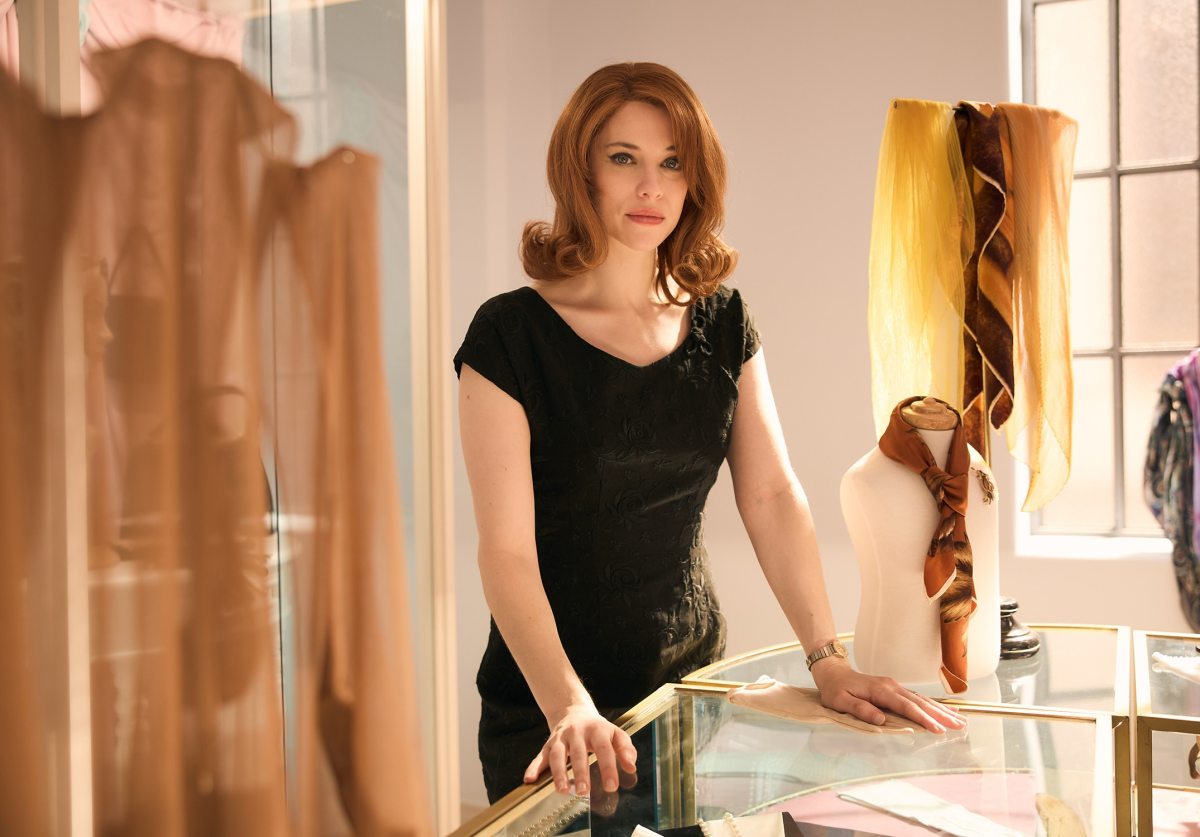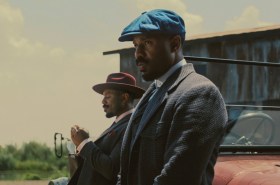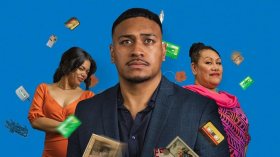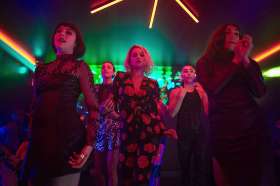Bruce Beresford’s 2018 feature film Ladies in Black successfully adapted Madeleine St John’s 1993 novel The Women in Black, a romantic comedy of manners set in the summer of 1959–60 among the staff of the Ladies’ Cocktail Frocks department at the fictional Goode’s Department Store in Sydney.
Set at a liminal moment in Australian social history, the film depicted Sydney through the eyes of European ‘continental’ emigré characters: as a sun-drenched paradise unspoiled by WWII horrors, populated by hapless people who needed to be nudged towards their inarticulate desires.
ABC’s new six-part series Ladies in Black, directed by Gracie Otto, begins a year after the film’s hopeful ending, propelling the same characters into the social changes the film only foreshadowed. It continues the film’s light, optimistic tone; but by widening its circle of characters and storylines Ladies in Black also depicts a broader cross-section of Australian society.
Retro delights
In a show that expresses a zeitgeist aesthetically, the design and art direction must be on point – and Otto understands better than Beresford the transformative power of the right garment. The costumes by Marion Boyce (The Dressmaker; Miss Fisher’s Murder Mysteries) beautifully express the sartorial tension between the conservative 1950s and the emerging 1960s mod youthquake and sexual revolution.
The beautiful Goode’s set, by production designer Michael Rumpf (In Limbo), should delight fans of Mad Men or The Marvelous Mrs Maisel – red velvet drapes and black-and-white chequerboard flooring in the ground-floor cosmetics department; Ladies’ Cocktail’s soft contours in white, gilt, salmon-pink and baby blue; and the old-fashioned wood panelling on the executive floor.
Ladies in Black does have some pretty dodgy wigs, though – especially the copper-toned helmet worn by Fay Janosi (Jessica de Gouw, The Artful Dodger). And a creative choice I found annoying in a series otherwise so meticulously embedded in its time was the anachronistic needle-drop music, from No Doubt’s ‘I’m Just A Girl’ to Bananarama’s cover of ‘Venus’.
Read: Austin, ABC review: local laughs by way of London seem a bit too loose
Financial pressures
It’s 1961, and Lisa Miles (a delightfully sparky Clare Hughes, Ten Pound Poms), the film’s innocent suburban protagonist, is working part-time at Goode’s while studying at the University of Sydney, where she’s pursuing journalistic aspirations at student paper Honi Soit alongside her supportive buddy Petra (Gemma Chua-Tran, Heartbreak High). Lisa is both erotically and intellectually obsessed with the paper’s editor Richard (Tom Wilson, Heartbreak High): the kind of self-satisfied, fauxhemian, story idea-stealing fuckboi that Lisa’s fretful mum (Sacha Horler, While the Men Are Away) is right to worry about.
But after her father dies suddenly, his extensive gambling debts throw the Miles family finances into chaos. And Lisa isn’t the only character who’s financially dependent on working at Goode’s.
Magda Szombathelyi (Debi Mazar, Younger), manager of the ‘Model Gowns’ couture department, and the agent of most romantic happiness in the original story, is quitting Goode’s to open her own boutique. Then she learns her husband Stefan (Russell Dykstra, In Limbo) has invested the boutique’s lease money in their friend Rudi Janosi’s (Thom Green, Of An Age) nascent trucking company, forcing a humiliated Magda to ask Goode’s general manager Mr Ryder (Huw Higginson, Total Control) for her job back.
It’s sad how money comes between friends. Magda’s rage spills from Stefan and Rudi to her coworker, Rudi’s Australian wife Fay – just as Fay needs Magda’s support because she’s beginning to suspect Rudi of infidelity. Pushing Magda’s marriage further onto the rocks is the shock arrival in Sydney of Stefan’s hitherto unmentioned young adult son, Cuban-American musician George (Carlos Sanson Jr, Bump).
Zeitgeists and power struggles
US actor Mazar makes a terrific Magda – fierce, wily and glamorous, but also vulnerable. And the workplace power struggles between Magda and her replacement, Virginia Ambrose (Miranda Otto,The Clearing), have a passive-aggressive spark that’s fun to watch.
Mrs Ambrose (as she insists on being called) has been headhunted from Harrods; and her old-fashioned, deferential English philosophy of customer service clashes with Magda’s voluble fussing and future-facing ideas – including a range of colourful clothes for ‘Young Sophisticates’.
Goode’s itself, a David Jones stand-in, is at a crossroads. It’s being pressured on price by competitor Younger Bros (LOL), and replicas of its supposedly one-of-a-kind Model Gowns are showing up at society events.
Goode’s conservative chief buyer Mr McKenzie (Todd McKenney, Unsound) teams up with Mrs Ambrose to oust Magda. But I found it disquieting that the series villain-codes McKenzie by making him a homosexual predator.
He bullies Goode’s young head of visual merchandising, Elias (Julian Maroun, The Secrets She Keeps), by calling him ‘Elsie’. And Elias – who’s also gay, but in a fun modern way – exploits McKenzie’s sexuality to enact revenge. Lateral violence!
Both Elias and Mrs Ambrose befriend Adam Conroy (Ngali Shaw, Windcatcher), an earnest young Aboriginal loading-bay staffer who aspires to sell menswear. Elias wants to defend Adam from McKenzie’s lecherous attentions; and Mrs Ambrose recognises Adam’s talent … and his usefulness against Magda.
Read: What’s on your screen: Ladies in Black succeeds with different view of Australian culture
Ladies in Black: secrets and lies
The Middle Eastern backgrounds of two show writers, Sarah Bassiuoni and Randa Sayed, clearly informed new character Angela Mansour (Azizi Donnelly), an aspiring fashion designer from a rag-trade family in Redfern’s ‘Little Beirut’. She’s introduced as a spy working at Goode’s to steal insider info for her tailor father (Hazem Shammas, The Clearing) and brother Farouk (Ubai Dahood, Westerners).
But as Angela’s initially combative relationship with Lisa thaws into friendship, she begins to see a different career path into fashion – just as Magda and Mrs Ambrose close in on the copyright thief.
The space between dishonesty and misunderstanding is classic TV drama fodder; and one of the soapiest plotlines follows lonely Fay’s travails. Feeling neglected as Rudi focuses on his business – or does he?? – she’s re-wooed by a former paramour, businessman Ken Marlow (Hamish Michael, The Twelve).
Of course, Marlow has a suspicious wife, Enid (Krew Boylan, Paper Dolls) – and poor oblivious Rudi is caught in the middle, believing the Marlows are keen to invest in his business.
But Ladies in Black is no grimy noir. It doesn’t ignore structural inequalities such as racism, sexism and classism, but nor does it truly entrap its characters within them. Appropriately for its sartorial theme, this is a story about code-switching: to pursue their dreams, almost everyone here must know how, and to whom, to perform a different self.
It’s also a show where characters step in to help each other’s projects and solve each other’s problems. This makes Ladies in Black a soothing antidote to the grim individualism of our neoliberal present – but perhaps we can still recapture its hopeful spirit of community and co-operation.
Ladies in Black is available to stream on ABC iView from 16 June.
Actors:
Debi Mazar, Miranda Otto, Jessica De Gouw
Director:
Gracie Otto
Format: TV Series
Country: Australia
Release: 16 June 2024





